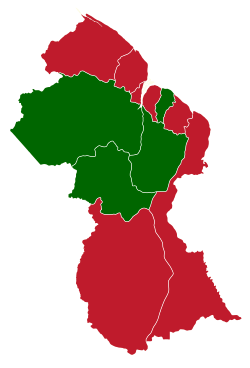15 December 1997 | |||||||||||||||||||||||||||||||
53 of the 65 seats in the National Assembly 33 seats needed for a majority | |||||||||||||||||||||||||||||||
|---|---|---|---|---|---|---|---|---|---|---|---|---|---|---|---|---|---|---|---|---|---|---|---|---|---|---|---|---|---|---|---|
| Registered | 461,481 | ||||||||||||||||||||||||||||||
| Turnout | 88.42% ( | ||||||||||||||||||||||||||||||
| |||||||||||||||||||||||||||||||
 Results by district | |||||||||||||||||||||||||||||||
| |||||||||||||||||||||||||||||||
 |
|---|
| Constitution |
General elections were held in Guyana on 15 December 1997. [1] The result was a victory for the People's Progressive Party/Civic, which won 29 of the 53 seats. Voter turnout was 88.4%. [1]

